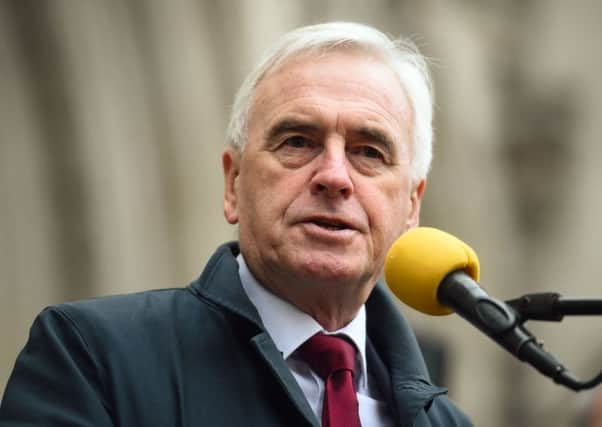Dear John McDonnell, if Winston Churchill is a villain, who is a hero? – Alastair Stewart


His comments follow MSP Ross Greer’s accusation last month that the wartime leader was a “white supremacist” and a “mass murderer”.
Was Churchill a villain? Yes! Of course he was! Any historical figure is if you’re determined to find fault with them.
Advertisement
Hide AdAdvertisement
Hide AdBut please, goodness, if you’re going to target a British statesman dead for 50 years let’s set some ground rules: no one is above reproach. Mohandas Gandhi was obsessed with sex; Martin Luther King Jr plagiarised parts of his doctoral dissertation and JFK had innumerable affairs to say nothing of the Bay of Pigs.
Inconvenient truths about ‘iconic’ figures are better than fabricated lies. The Miners Strike of 1910, to which McDonnell refers, took place in south Wales when Churchill was Home Secretary. He was alleged to have sent troops to intervene, but like the Glasgow strikes (or the ‘Battle of George Square’) in 1919, Churchill left the request for troops to local authorities. In each case, both events are held up as proof of Churchill’s innate barbarism and alleged anti-trade union feeling despite all evidence to the contrary.
The real question is why bring it up now when Churchill has been dead for 54 years? Consider what Churchill represents and to whom.
I’ve written before in The Scotsman that he’s stuck in a tug of war between a cult of sycophants and a gang of detractors determined to knock him down. Somewhere in the middle is the truth.
Churchill is a symbol of British defiance; he’s also the starting gun on a question that has dogged British foreign policy and public opinion for 70 years – does Europe owe us something?
The mind boggles as to what could possibly be on the mind of McDonnell when taking aim at Churchill.
Could it perhaps be about the Brexit debacle that he and his party are engaged in? A bit of a “back in your place” backhand to the more radical Brexiteers who’ve adopted Churchill, Spitfires and Dunkirk as their own personal raison d’etre for why Britain must leave the European Union?
There’s not a political ‘icon’ in the history of the British Isles who cannot be hijacked by issues of the day. Margaret Thatcher, forever the bugbear of the left, introduced the Right to Buy. Clement Attlee, the dartboard bull’s eye for the right, also happened to have developed Britain’s nuclear deterrent.
Advertisement
Hide AdAdvertisement
Hide AdIt’s impossible to refute Churchill as a British symbol whether you like him or loathe him. He belonged to the Liberals and the Conservatives and was as much a failure as a success in public office.
There are over 1,000 books written about him, and it is utter lunacy to think they’re all self-indulgent sycophancy. There is enough critical material on Churchill to avoid coddling myth-making and hyperbole to serve contemporary political interests.
Churchill was a realist, a romantic and a historian. From a young age, his profound sense of destiny was wrapped up in himself. His conceited bombast and polymathic talent guaranteed that even if he’d been born a Frenchman, he would still have found a place in history as sure as history would have found a place for him.
The world he helped shape between 1940 and 1960 still exists in part today – it’s why he’s such an easy target. He also made some disastrous political gaffes, and military blunders which cost lives and no one is denying these, only calling out the unfounded cliches.
The evidence is there, the facts are known, and they are not some dark secrets waiting to be exposed. The conversation about Churchill’s career, his merits, his failings and his place in history have never stopped. All that has changed is that his symbol as a British icon is now irrevocably wrapped up in the question of what it means to be British.
As Brexit looms, that’s a question which has been and may never be answered completely.
So if Churchill is the villain, who are the political saints?
Alastair Stewart is a freelance writer and journalist. He writes regular features on politics and history with a particular interest in nationalism and the life of Sir Winston Churchill. Read more from Alastair at www.agjstewart.com and follow him on Twitter @agjstewart